Key Summary
- UK universities rank significantly higher globally, with Cambridge (#2), Oxford (#3), and Imperial (#6) leading, while Ireland’s top school, Trinity College, ranks #81, though UK tuition costs more at £8,000-£30,000 annually.
- Ireland offers cheaper education and easier admission, with lower fees (€9,000-€26,000 vs £8,000-£30,000), reduced IELTS requirements (6.0 vs 6.5), and 40-hour weekly work permits during holidays for international students.
- Both countries provide equal career opportunities, offering competitive graduate salaries (UK: £29,500+; Ireland: €33,383-€65,000), 5-year paths to permanent residency, and extensive employment in technology and finance sectors.
The United Kingdom and Ireland are frequently chosen as study destinations by international students worldwide. These countries have a reputation for offering world-class education and extensive employment opportunities. Both nations boast high-ranked universities and great living conditions. This creates confusion among students about whether they should study in the UK or Ireland, as both are excellent study-abroad destinations. Keep reading this blog if you are also baffled about which option is better. We will clear all your doubts regarding the UK vs Ireland. We will compare these two countries, and towards the end of this blog, we will conclude which one is a better study-abroad destination.
Each section in this blog will discuss an aspect of these countries. The one which is better in a particular aspect will be awarded +2 points. We will add these points and finally conclude at the end which country is better based on the total computed score. The nation with the highest score will win this UK vs Ireland contest.
| Parameters | UK | Ireland |
| Area | 209,331 KM² | 84,421 KM² |
| Currency | Pound Sterling (£) | Euro (€) |
| Capital | London | Dublin |
| Total Higher Education Providers | 295 | 22 |
| Total Indian Students Studying | 120,000 | 4,000 |
| Average Cost of Living | £919 Per Month | €1,000 – €1,500 Per Month |
| Average Cost of Studying | £10,000 to £38,000 Per Year | €12,000 Per Annum |
| Popular Job Sectors | Accountancy, Business, Banking and Finance, Consulting and Management, Creative Arts and Design, and Energy and utilities. | Technology, Accounting and Finance, Construction, Creative Design, Web Development, Nursing, and Business Skills. |
| Permitted Part-Time Working Hours | 20 Hours Per Week | Up To 40 Hours Per Week During Holidays and 20 hours Per Week During the School Year |
This Blog Includes:
Top-Ranked Universities: UK vs Ireland
A good university plays a key role in shaping your career. Hence, one should choose their institute wisely. We have given below some of the most prominent universities in the UK and Ireland to help you make the selection. At the end of this section, we will assess which country has better universities.
Universities in the UK
Here are some of the most prestigious universities in the UK:
| Top Universities in the UK | QS World University Rankings 2025 | Times Higher Education World University Rankings 2025 |
| University of Oxford | 3 (QS) | 1 |
| University of Cambridge | 5 (QS) | 5 |
| Imperial College London | 2 (QS) | 9 |
| UCL (University College London) | 9 (QS) | 22 |
| University of Edinburgh | 27 (QS) | 29 |
| University of Manchester | 34 (QS) | 53 |
| King’s College London | 40 (QS) | 36 |
| London School of Economics and Political Science (LSE) | 50 (QS) | 50 |
| University of Bristol | — (Not in top 100 QS) | 78 |
| University of Warwick | — (Not in top 100 QS) | 106 |
| University of Leeds | — (Not in top 100 QS) | 123 |
| University of Glasgow | — (Not in top 100 QS) | 87 |
| Durham University | — (Not in top 100 QS) | — (THE > 200) |
| University of Southampton | — (Not in top 100 QS) | 115 |
| University of Birmingham | — (Not in top 100 QS) | 93 |
| University of St Andrews | — (Not in top 100 QS) | ~185 |
| University of Nottingham | — (Not in top 100 QS) | 136 |
| University of Sheffield | — (Not in top 100 QS) | 98 |
| Newcastle University | — (Not in top 100 QS) | 157 |
| Lancaster University | — (Not in top 100 QS) | 168 |
Universities in Ireland
The table below provides a list of the top universities in Ireland:
| Top Universities in Ireland | QS World University Rankings 2025 | Times Higher Education World University Rankings 2025 |
| Trinity College Dublin, The University of Dublin | 87 | 134 |
| University College Dublin (UCD) | 126 | 201–250 |
| University of Galway | 273 | 351–400 |
| University College Cork (UCC) | 273 | 251–300 |
| Dublin City University (DCU) | 421 | 401–500 |
| University of Limerick (UL) | 421 | 351–400 |
| Maynooth University | 801–850 | 401–500 |
Which Country is Better?
It is apparent from the above comparison that the UK houses higher-ranked universities when compared to Ireland. Hence, we will award +2 points to the UK in this round of the UK vs Ireland.
Also Read: The Cheapest University in Edinburgh For You to Consider if You Are on a Budget
Admission Requirements
One should carefully understand the admission requirements when choosing their study-abroad destination. Hence, we will discuss in detail the criteria for admission in the UK and Ireland.
Admission Requirements For the UK
Here are the entry requirements for the UK universities:
- Students need to have an IELTS score of 6.5, a PTE score of 54+, a TOEFL score of 70-100, and a Duolingo score of 105-120.
- Applicants have to submit the following documents:
- Academic transcripts
- A valid passport
- ID proof
- Statement of Purpose
- Letters of recommendation
- English language proficiency scores
- Other exam scores, if any
- Portfolio (if applicable)
- Proof of funds and other bank statements
- CV/ Resume
- The applicants must also apply for the Tier 4 student visa.
- They must have scored at least 65% on their Class 12 examination.
Admission Requirements For Ireland
The admission criteria for gaining admission to Irish universities are as follows:
- The students must possess a current passport.
- Moreover, they need to score a minimum IELTS score of 6.0, a PTE score of 36 (UG), a PTE score of 63 (PG), a TOEFL iBT score of 90, and a Cambridge ESOL score of C1 or C2.
- The applicants are also required to have a medical insurance policy of a minimum value of €25,000
- The students need to provide proof of sufficient funds.
- You also have to submit some necessary documents, including:
- An offer letter from a college confirming your acceptance
- Two passport pictures
- A receipt as verification of registration and payment of tuition fees
- Additional university-specific requirements
Which Country is Better?
The above comparison shows that it is harder to get admission into UK universities when compared to Ireland universities. Hence, we will grant +2 points to Ireland in this round of UK vs Ireland.
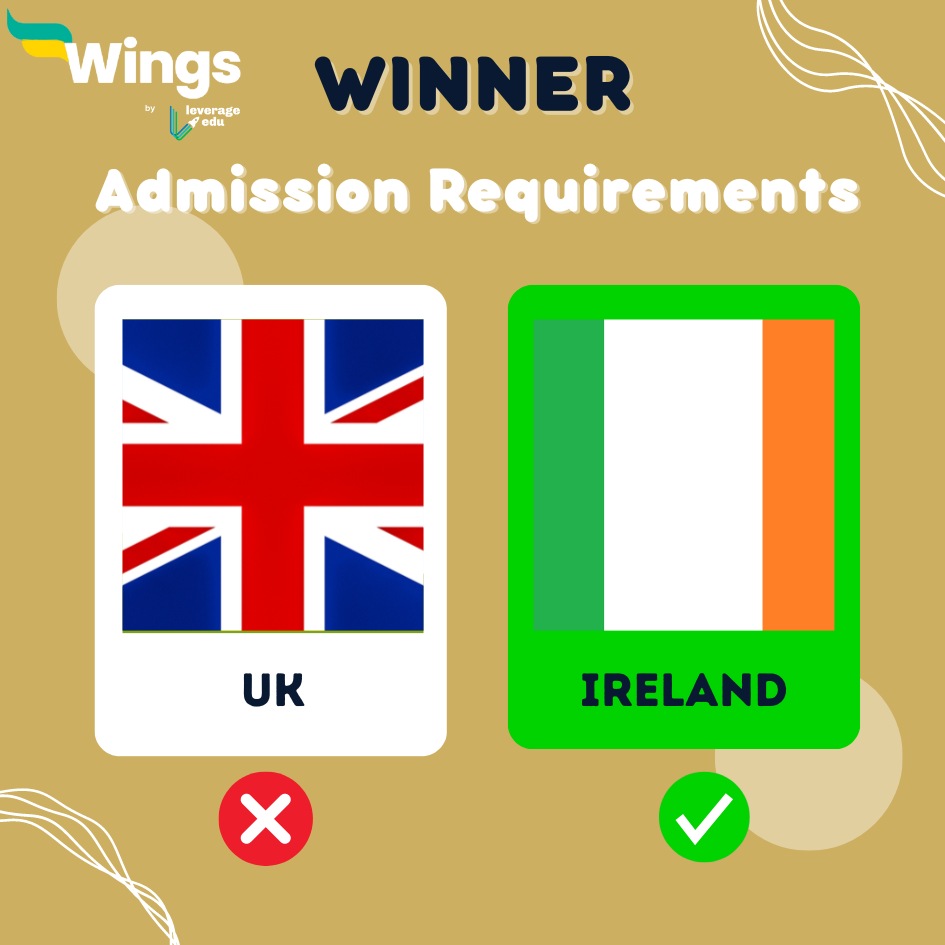
Also Read: Which is the Oldest University in England? Read About it Here!
Tuition Fees
This section will find which country has the lowest tuition costs. The one with the lowest educational cost will win this round.
Tuition Fees in the UK
According to the websites of the UK universities, the average annual tuition fees in the nation are as follows:
| Study Program | Average Annual Tuition Fee |
| Undergraduate | £8,000 – £30,000 |
| Postgraduate | £12,000 |
| Doctoral | £20,000 – £50,000 |
Tuition Fees in Ireland
The average annual tuition costs in Ireland as per the website of the universities in the country are given in the table below:
| Study Program | Average Annual Tuition Fee |
| Undergraduate | €9,000 to €26,000 |
| Postgraduate | €9,000 to €35,000 |
| Doctoral | €9,000 to €40,000 |
Which Country is Better?
The above tables show that Ireland has lower tuition fees when compared to the UK. Hence, Ireland will be awarded +2 points in this round of UK vs Ireland.

Also Read: Study at Universities in London Without IELTS
Living Expenses
The cost of living is one of the major concerns that students have when choosing a study-abroad destination. So, let’s compare the cost of living in the UK and Ireland.
Cost of Living in the UK
The cost of living in the UK as per Numbeo is shown below:
| Monthly Rent | £723.47 – £1,606.95 |
| Average Apartment Price (Price per Square Metre) | £3,333.25 – £4,456.38 |
| Average Cost of an Inexpensive Restaurant Meal | £15 |
| Average Transportation Cost | £67.9 |
| Average Cost of Utility (Monthly) | £252.75 |
Cost of Living in Ireland
The living expenses in Ireland according to Numbeo are as follows:
| Monthly Rent | €1,254.49 – €2,480.65 |
| Average Apartment Price (Price per Square Metre) | €3,532.03 – €4,882.53 |
| Average Cost of an Inexpensive Restaurant Meal | €15 |
| Average Transportation Cost (Monthly) | €100 |
| Average Cost of Utility (Monthly) | €276.21 |
Which Country is Better?
The above comparison shows that the cost of living in the UK is more than the cost of living in Ireland. Hence, Ireland will receive +2 points in this round of UK vs Ireland.
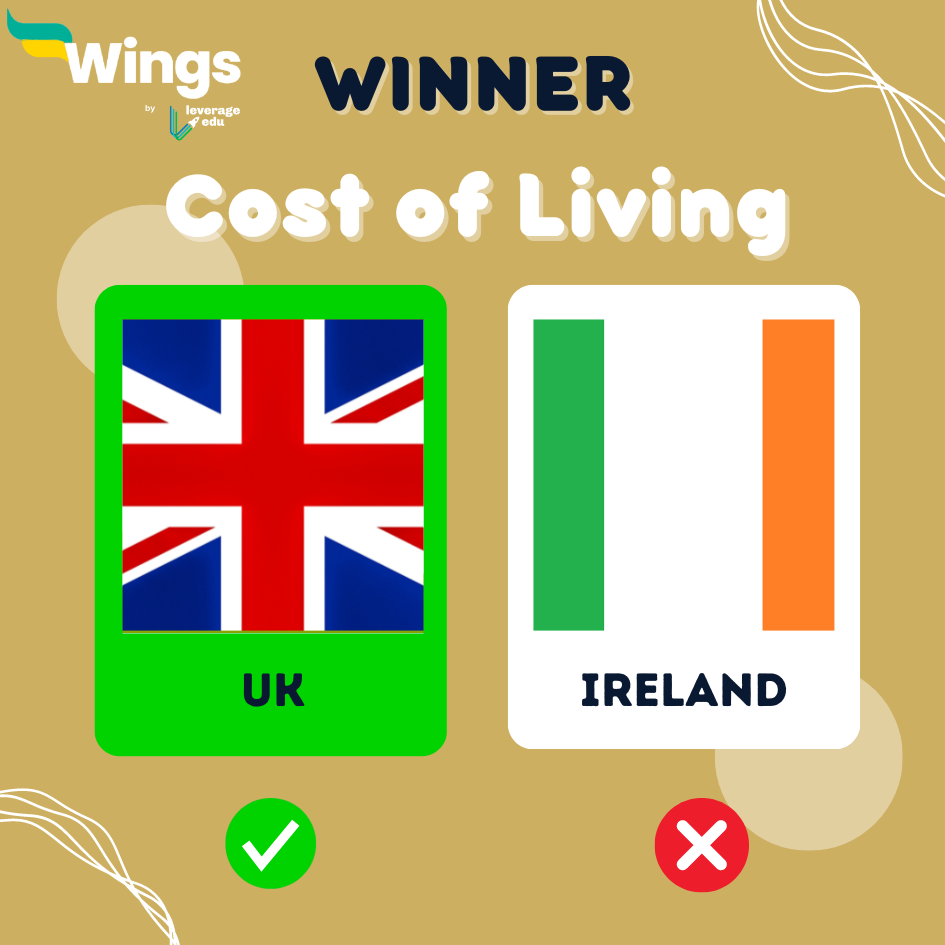
Also Read: 🖥️MS in Data Analytics in UK: Colleges, Scholarships, Fees, Scope
Work Permit and PR
Students often study abroad to find employment and eventually obtain permanent residency. Let us compare the ease of receiving a work visa and permanent residency in the UK with Ireland.
Work Permit in the UK
Here is how a work permit is given in the UK:
Eligibility Criteria for a Work Permit in the UK
To obtain a work permit in the UK, you must have:
- Passport & travel history,
- UK Job details,
- Certificate of Sponsorship,
- English Language Proficiency,
- Educational and business credentials, and
- Evidence you are outside the UK & employed by a non-UK-based company.
Apply for a Work Permit in the UK
A work permit cannot be directly granted from the UK. Your employer has to apply for a work permit on your behalf in the UK. The duration of your visa processing will rely on the nature of your activity and the kind of license you obtain.
The work visa is created for highly trained and qualified foreign workers who can help in the UK’s economic growth and productivity. Investors, entrepreneurs, and extraordinary talent are considered eligible for this visa category.
This category includes the following professions:
- IT specialists;
- Doctors (Physicians);
- Engineers;
- Scientists;
- Innovators;
- Entrepreneurs;
- Finance experts;
- Others
You will receive a decision on your work permit within 3 weeks of applying.
PR in the UK
PR is also called Indefinite Leave to Remain (ILR) in the UK. In most cases, you need to live in the UK continuously for a minimum of 5 years before applying for PR. The amount of time to obtain UK PR status depends on the type of UK visa you have.
Work Permit in Ireland
Let’s understand the process of receiving a work permit in Ireland:
Eligibility Criteria for a Work Permit in Ireland
You must meet the following eligibility criteria to get a work permit in Ireland:
- The applicants must be hired temporarily. They might also receive a bid from an Ireland-based company.
- The firm has to clear the Labour Markets Needs Test in case the candidate is applying for a work visa (other than a Critical Skills Employment visa).
- This test demonstrates that the Irish-descent employer was unable to fill the vacancy with a qualified Irish or EU/EEA/Swiss citizen.
- If you wish to become eligible for a Critical Skills Employment Permit, you are required to earn at least €30,000 or €80,000 annually. This depends on the type of work you are seeking.
- Applicants for General Work Permits need to have a minimum yearly wage of €30,000.
- The minimum annual wage must meet the National Minimum Wage, except for the General Employment Permit and Critical Skills Employment Permit.
- The Irish employer that hires the applicant for a work visa has to employ at least 50% of its personnel from the EU, EEA, or Switzerland.
Apply for a Work Permit in Ireland
You must first identify the kind of work permit you wish to apply for. Post figuring out the needed work permit, the applicant has to complete the associated application form. The Irish work permit takes about 13 weeks to process. The candidates can check the status of their work visa for Ireland on the DBEI website.
PR in Ireland
If you are a non-EEA national who has been legally residing in Ireland for the last 5 years and have a work permit, you can obtain permanent residence in Ireland.
Which Country is Better?
The above comparison shows the process of receiving a work permit and permanent residency is equally easier in Ireland. Hence, Ireland receives +2 points in this round of UK vs Ireland.
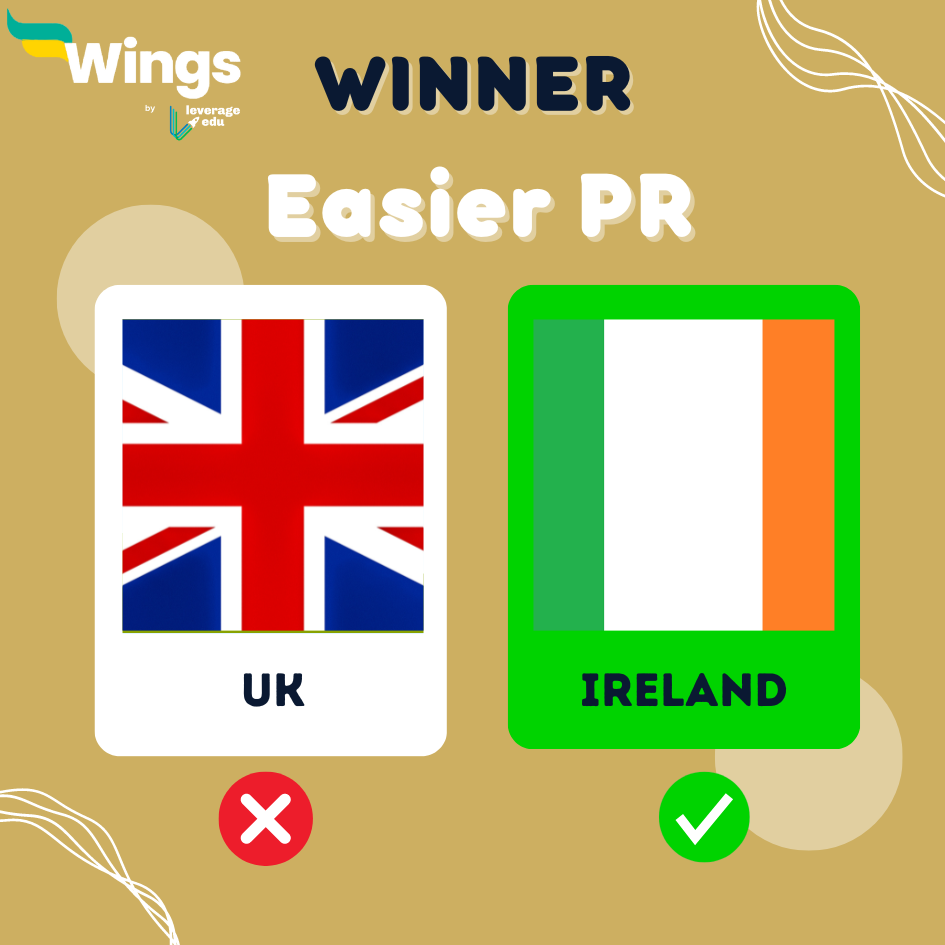
Also Read: 🎓Top Veterinary Courses in Ireland 2024
Average Salaries: UK vs Ireland
The average annual salary in the UK is £29,500 after graduation, while it is £30,442 for a postgraduate. On the other hand, the average salary is €33,383 to €50,000 per year in Ireland after graduation, whereas it is €65,000 per year after postgraduation.
Which Country is Better?
It is apparent from the above comparison that both the UK and Ireland offer a high salary. Hence, we will give +2 points to both the UK and Ireland in this round of UK vs Ireland.

Also Read: Top 1-Year Degree Courses in Ireland 2024
Other Major Elements
Now, let’s look at some other crucial factors that should be considered while choosing where to study abroad. These crucial elements are given below:
Climate
The climate in the UK usually has hot summers and cold winters. On the other hand, the climate of Ireland is greatly affected by the Atlantic Ocean. The warm ocean currents keep the climate temperate in the nation.
Safety
Both the United Kingdom and Ireland are known to be mostly safe. These nations are very welcoming and friendly to international students. So, safety is the last thing you should be concerned about while studying in any of these nations.
Culture for International Students
If we talk about the UK, its residents are friendly but can be reserved when communicating with strangers, just like in India. Coming to Ireland, the people here are famous for their warm hospitality and friendly nature, making it easy for overseas students to feel embraced and welcomed.
Also Read: 🇮🇪 MSc Finance in Ireland: Top Universities, Eligibility, Admission Process & Scholarships
Conclusion
If we compute the scores of the UK and Ireland, we find that both the UK and Ireland have received 6 points. Hence, it is a tie between both the countries.
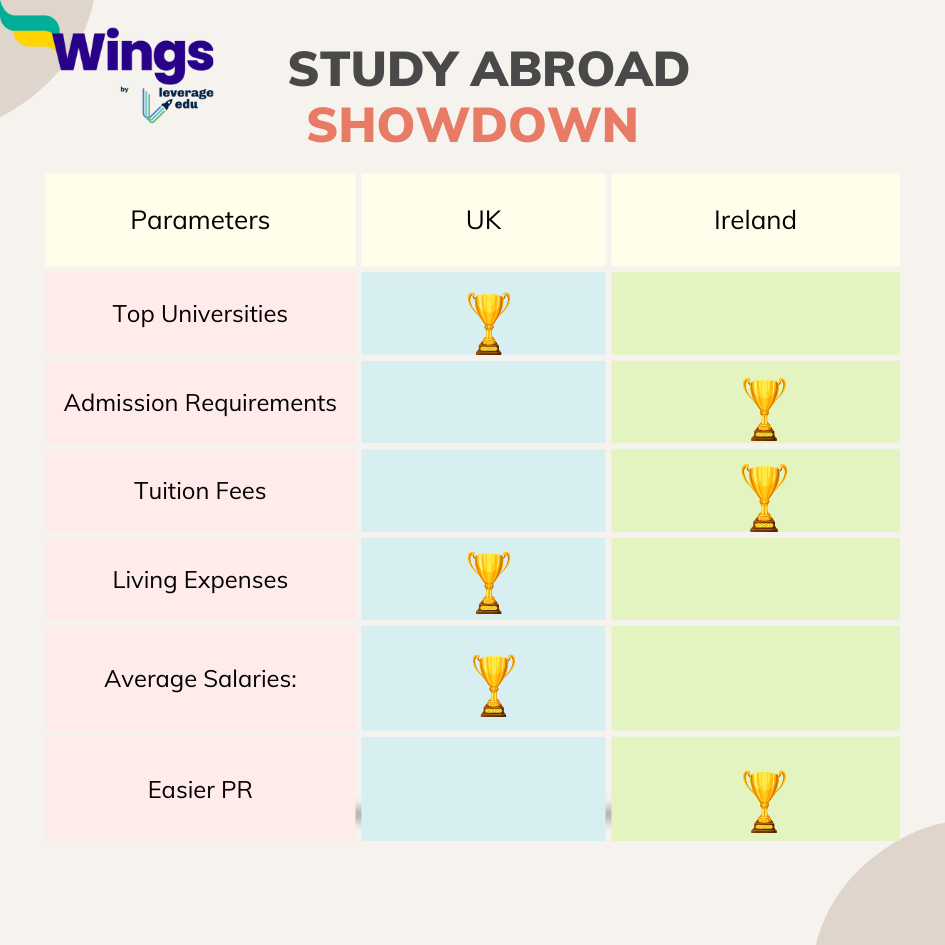
However, make sure you properly assess the advantages and disadvantages of both countries before making your final decision. Your personal choice depends on various factors, such as your budget, course, goal, and more. Having said that, both the UK and Ireland are outstanding study-abroad destinations.

FAQs
Ans. Both the UK and Ireland offer world-class education, a good quality of life, and extensive employment opportunities. Your choice depends on numerous factors, such as your budget and the course you are opting for.
Ans. Both the UK and Ireland offer extensive job opportunities and high salaries.
Ans. The income tax rates are almost the same in both countries.
Related Articles:
So, this was all about the UK vs Ireland. Many Indian students dream of pursuing education in foreign nations due to the exposure and career growth they offer. Consider joining a free counselling session with Leverage Edu if you plan to study abroad.


 One app for all your study abroad needs
One app for all your study abroad needs











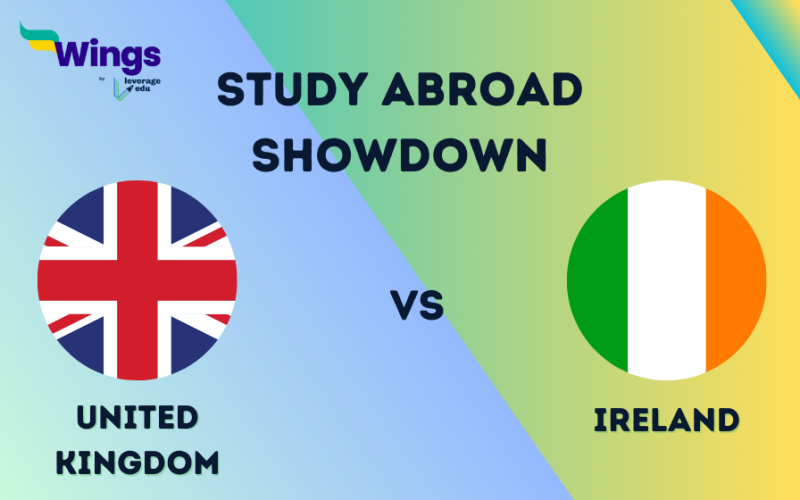
 60,000+ students trusted us with their dreams. Take the first step today!
60,000+ students trusted us with their dreams. Take the first step today!